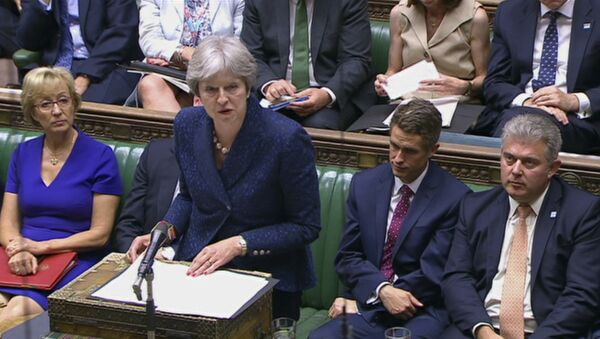More than two-thirds of lawmakers voted against the proposed agreement, marking the largest defeat for a sitting UK government in history; 118 votes against the deal came from MPs from PM May's own Conservative Party.
Meanwhile, EU Chief Brexit Negotiator Michel Barnier said on Wednesday that the risk of Britain crashing out of the EU is at an all-time high. This came as European Council President Donald Tusk suggested that the United Kingdom should remain in the bloc.
Radio Sputnik talked about Theresa May's efforts to break the Brexit deadlock with Yannis Koutsomitis, a Belgium-based political and economic analyst.
Yannis Koutsomitis: Well, this is a very good question because Mrs. May is being very adamant about not changing the agreement in any case. But there is talk right now of a possible new proposal, a new approach by Mrs. May. But the real problem right now, in my understanding, is that she needs to protect the integrity of the Tory Party. This is the main aim right now for Mrs. May, not to cause a rift within the Conservative Party.
READ MORE: EU Economies Stuttering & Positive Noises from Germany: Boris Talks Real Brexit
Sputnik: Is a no-deal Brexit more or less likely now after Mrs. May's deal was rejected in Parliament?
Yannis Koutsomitis: I think it is more likely because time is running out. The Tory Party has three different approaches to the procedure and until now there is no legal […] a no-deal Brexit. So it will be a chance for a no-deal Brexit.
READ MORE: 'Gollum-May' Sings Brexit-Inspired Bohemian Rhapsody Song, Conquers Social Media
Sputnik: We saw that only 10 DUP votes helped Mrs. May to secure her position as prime minister. Meanwhile, Jeremy Corbyn has refused to join the talks unless a no-deal Brexit is ruled out. How vital are Labour Party votes for the deal?
READ MORE: New CDU Leader, Industry Representatives Publicly Appeal to UK to Remain in EU
Sputnik: Mrs. May said that Britain will be leaving the European Union on 29 March and former PM Tony Blair said: "a delay to Brexit is now inevitable". How do you think the situation will develop further?
Yannis Koutsomitis: Well, we have seen reports in the papers today that the electoral commission is already preparing plans for a delay of the exit talk. I think this is inevitable. In order to have a proper deal, there needs to be a real consensus with the European Union, and extend the Article 50 [deadline for] at least for three months.
The views and opinions expressed by the speaker do not necessarily reflect those of Sputnik.



